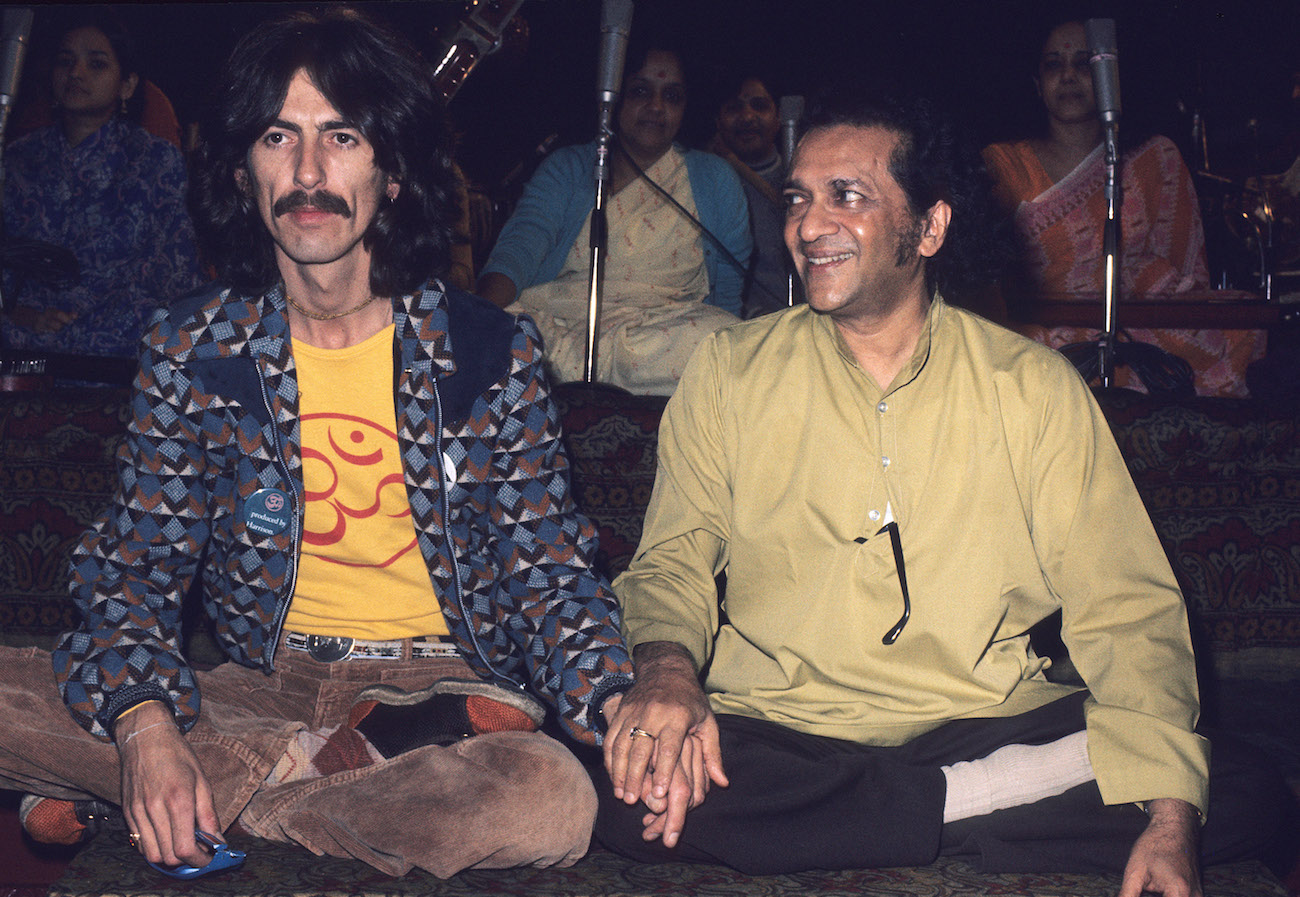
George Harrison Believed People Hated Him for Being Spiritual
George Harrison started learning about spiritual matters in the mid-1960s. However, by the early 1970s, he was fully entrenched in it. To some, it looked like George was going to retreat into Friar Park and spend his days chanting to Krishna, never to be seen again. Eventually, George started believing people, and more importantly, his family and friends hated him for being so spiritual.

George Harrison segregated himself from friends and family who weren’t as spiritual as him
A series of events catapulted George into his spiritual journey. First, he took LSD, which opened his mind up to God-consciousness. Then, he heard Indian music on the set of The Beatles’ Help! Next, he bought a sitar and discovered Ravi Shankar’s music.
In 1965, George met Shankar, who immediately wanted to teach George everything he knew. His most important lesson was that God is sound and that one can connect to God by playing the right notes. Once the legendary sitarist began teaching George sitar, the Beatle felt he could’ve left everything behind, including Boyd, to learn more. Learning Indian music was just a stepping stone to a spiritual path.
Nothing was giving him a buzz anymore, but spirituality offered the famous rock star some answers to the meaning of his life. George learned more about God-consciousness from Raja-Yoga by Swami Vivekananda, which said, “If there is a God we must see Him . . . otherwise it is better not to believe.”
George traveled to sacred lands in India and stayed at the Maharishi Mahesh Yogi’s ashram in Rishikesh to learn about Transcendental Meditation. Through yoga and meditation, George learned about his true self.
In the late-1960s, George became friends with devotees from the London Hare Krishna Temple. He recorded an album for them and published a sacred text for their leader Bhaktivedanta Swami, a.k.a. Prabhupada.
By the early 1970s, George was even more entrenched in spiritual matters. The Beatles were over, so he had more time to devote to his spiritual path.
Eventually, George’s friends, who weren’t as spiritual, felt him slipping away. In Here Comes The Sun: The Spiritual And Musical Journey Of George Harrison, Joshua M. Greene wrote, “Critics wondered if he had ‘gone crackers’ from too much meditation while friends felt disconnected from him, and with good reason: he had lost interest in all-night parties with nonbelievers.
“He declined invitations so consistently that even old chums viewed his enthusiasm for God as wandering beyond reasonable boundaries.”
“Unfortunately he was derided by certain sections,” said friend and former Beatles PR agent Tony Calder, “because they couldn’t quite accept that George could be involved with . . . these kids walking up and down High Street banging a tambourine and singing ‘Hare Krishna, Hare Krishna.'” Greene added, “Some people even wondered if his missionary zeal had contributed to the breakup of the Beatles.”
George started thinking people hated him for being spiritual
In 1973, George visited Prabhupada at the estate he’d purchased for the London Krishna Society. He wanted to tell the guru of his doubts about spirituality. Yet, he was still heavily devoted to Krishna.
“Prabhupada, I seem to be going around in circles,” George said. “Maybe it’s something to do with me being, you know, a Pisces—one fish going this way and one fish going that way. I have periods when I just can’t stop chanting, and then other periods where, you know, I turn into a demon again and then forget to…”
The guru reassured George, “You are not a demon. You are a devotee. Some way or other you have got attached to Krishna. Are you reading Bhagavad Gita? That will help you. Keep reading. All answers are there.”
George told his guru his deeper issue. “You know,” George said, “when you commit yourself to something, in a way it’s like putting your head on the chopping block. I find that the more commitment I make, even though, relatively speaking, it’s such a little commitment, I find that now I’m getting people angry.
“I’m provoking a bad reaction. The stronger the commitment on my part, the stronger the animosity becomes. You know, sometimes I get the feeling maybe there’s one person who finds what I’m trying to say meaningful, and 10 people—for them it doesn’t mean anything.
“And I’m not sure if it all balances out in the end, whether reaching that one person is worth the 10 or twenty who get annoyed with you. Maybe if you don’t say anything, all of them will be quite friendly.”
What George’s guru had to say
Prabhupada gave George the advice he was looking for about his struggles in this spiritual journey.
“Yes,” Prabhupada said, “in preaching there is always a possibility of creating animosity. ‘If you give good instruction to a fool, he becomes angry [Bengali proverb].’ But when one preaches he must tell the truth. Lord Jesus Christ—the people did not like his preaching, but he did not stop, even though they would kill him. Especially in speaking God-consciousness such things are possible, you see. We have to pay sometimes in this way.”
George didn’t like being compared to Jesus, but the guru’s words made sense. “If you take risk for Krishna,” Prabhupada said, “even if you stand to lose everything, Krishna comes to help and protect.” George knew people would always be afraid of things they didn’t understand, including spirituality. However, he wouldn’t give up what he loved just for their benefit.
Still, George was scared of distancing himself, not just from the public, but from his loved ones. He said, “There’s only certain times when I see Shyamsundar or a few other devotees. Most of the other people in my life, my friends—even my wife—I suddenly find myself on such a different level that it’s hard to relate to them.
“I have to decide to either slow down and pull back in order to bring these people with me—maybe because I’m not really ready to go myself—or just cut the whole thing off. More and more the mantra builds up in me, and the effect is so subtle in a way that there’s a point where I just can’t relate to anybody anymore.
“There’s a point where I’m not going to know these people anymore. So the problem is this—where to find a balance?”
The guru replied, “You keep balance. Don’t spoil your position. Keep your position. And keep the balance external and internal.” Ultimately, George had a particular purpose in the universe, so he shouldn’t change himself. Krishna would help him.
George listened to Prabhupada and stayed spiritual for the rest of his life. Eventually, he made lasting friendships with other musicians who didn’t think he was preachy or weird for being spiritual. George also married a woman, Olivia, who was already on a spiritual path and understood him. So, maybe some cosmic intervention did happen.


